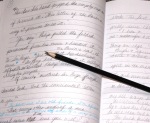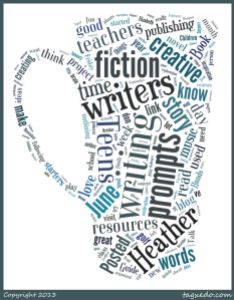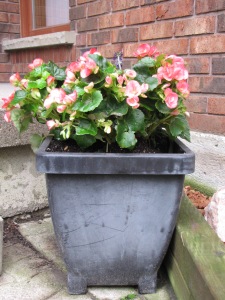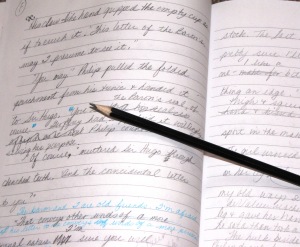 31-35 Just one prompt today and that’s for NaNoWriMo writers like me who don’t have a plot yet.
31-35 Just one prompt today and that’s for NaNoWriMo writers like me who don’t have a plot yet.
A sure-fire plot plan exists in the steps of the hero’s journey. Documented by scholars such as Joseph Campbell, this pattern has been worked into stories across cultures and millennia. I wrote a fantasy for middle readers several years ago, and when I looked back, I found I had unconsciously followed the pattern almost perfectly. It’s been used in movies as diverse as Star Wars, The Lion King and The Princess Diaries.
Two great books on the subject and how the pattern applies to writing today are: The Writer’s Journey: Mythic Structure for Writers by Christopher Vogler and The Key: How to Write Damn Good Fiction Using the Power of Myth by James N. Frey. Here’s the journey as Vogler describes it. Take your heroes and heroines on the same journey and see what happens.
The Hero’s Journey Outline
The Hero’s Journey is a pattern of narrative identified by the American scholar Joseph Campbell that appears in drama, storytelling, myth, religious ritual, and psychological development. It describes the typical adventure of the archetype known as The Hero, the person who goes out and achieves great deeds on behalf of the group, tribe, or civilization.
Its stages are:
1. THE ORDINARY WORLD. The hero, uneasy, uncomfortable or unaware, is introduced sympathetically so the audience can identify with the situation or dilemma. The hero is shown against a background of environment, heredity, and personal history. Some kind of polarity in the hero’s life is pulling in different directions and causing stress.
2. THE CALL TO ADVENTURE. Something shakes up the situation, either from external pressures or from something rising up from deep within, so the hero must face the beginnings of change.
3. REFUSAL OF THE CALL. The hero feels the fear of the unknown and tries to turn away from the adventure, however briefly. Alternately, another character may express the uncertainty and danger ahead.
4. MEETING WITH THE MENTOR. The hero comes across a seasoned traveler of the worlds who gives him or her training, equipment, or advice that will help on the journey. Or the hero reaches within to a source of courage and wisdom.
5. CROSSING THE THRESHOLD. At the end of Act One, the hero commits to leaving the Ordinary World and entering a new region or condition with unfamiliar rules and values.
6. TESTS, ALLIES AND ENEMIES. The hero is tested and sorts out allegiances in the Special World.
7. APPROACH. The hero and newfound allies prepare for the major challenge in the Special world.
8. THE ORDEAL. Near the middle of the story, the hero enters a central space in the Special World and confronts death or faces his or her greatest fear. Out of the moment of death comes a new life.
9. THE REWARD. The hero takes possession of the treasure won by facing death. There may be celebration, but there is also danger of losing the treasure again.
10. THE ROAD BACK. About three-fourths of the way through the story, the hero is driven to complete the adventure, leaving the Special World to be sure the treasure is brought home. Often a chase scene signals the urgency and danger of the mission.
11. THE RESURRECTION. At the climax, the hero is severely tested once more on the threshold of home. He or she is purified by a last sacrifice, another moment of death and rebirth, but on a higher and more complete level. By the hero’s action, the polarities that were in conflict at the beginning are finally resolved.
12. RETURN WITH THE ELIXIR. The hero returns home or continues the journey, bearing some element of the treasure that has the power to transform the world as the hero has been transformed.
Like this:
Like Loading...







 31-35 Just one prompt today and that’s for NaNoWriMo writers like me who don’t have a plot yet.
31-35 Just one prompt today and that’s for NaNoWriMo writers like me who don’t have a plot yet.